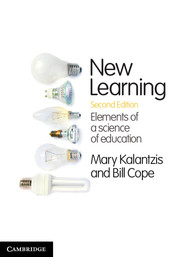Book contents
- Frontmatter
- Contents
- Introduction
- Part A Introduction
- Part B Contexts
- Part C Responses
- Chapter 6 The nature of learning
- Chapter 7 Knowledge and learning
- Chapter 8 Pedagogy and curriculum
- Chapter 9 Learning communities at work
- Chapter 10 Measuring learning
- References and further reading
- Index
- Acknowledgements
Chapter 9 - Learning communities at work
Published online by Cambridge University Press: 05 February 2013
- Frontmatter
- Contents
- Introduction
- Part A Introduction
- Part B Contexts
- Part C Responses
- Chapter 6 The nature of learning
- Chapter 7 Knowledge and learning
- Chapter 8 Pedagogy and curriculum
- Chapter 9 Learning communities at work
- Chapter 10 Measuring learning
- References and further reading
- Index
- Acknowledgements
Summary
Overview
This chapter explores different ways in which learning communities are organised. In the past, institutions of learning had neat and definable boundaries. Today, education can take place as a full-time activity at a particular time in your life and in a particular place, or as a part-time activity anytime in your life and anywhere you happen to be, such as at home or at work. Education is lifelong and life-wide.
One thing about education persists, no matter where and when it is and whatever its mode of organisation: it involves consciously designed, formally organised and explicit knowledge acquisition for learners. This makes it different from informal learning, which is an incidental and inevitable aspect of lifeworld experience. This chapter discusses three modes of organisation of formal learning or education.
Bureaucratic organisation of learning entails centralised and hierarchical control of educational institutions and the knowledge they distribute. Knowledge and authority are passed down from level to level, through chains of command. Finally, at the bottom level, knowledge is transmitted from teachers to learners in classrooms. This allows for little more than an ‘assisted competence’, in which teachers rely on curriculum content and disciplinary rules handed down to them, and learners rely on sources of authority to guide their action and as the source of their knowledge.
- Type
- Chapter
- Information
- New LearningElements of a Science of Education, pp. 283 - 304Publisher: Cambridge University PressPrint publication year: 2012



